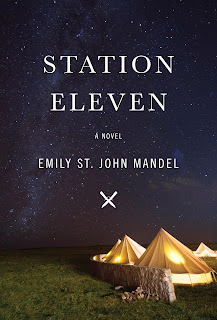Station Eleven (the book): A Review of the Post-Apocalypse
By Péter MARTON
Having just finished Emily St. John Mandel's Station Eleven (the 2015 winner of the Arthur C. Clarke Award), a part post-apocalyptic, part pre-apocalyptic novel with (inevitably and yet mostly just implicitly) the apocalypse in its centre, here are a few quick notes, in praise as well as criticism – not as a literary review, but mainly in reaction to the plot: its plausibility and its implications.
As a work of literature I really liked this book – I enjoyed it, even. It is moody and haunting, as many would say. All the characters want to be somewhere else, even some time else. The story is effectively a collection of their memories upon memories of times, places and faces past.
What follows here, however, is the dirty work – the ugly analysis of probabilities and plausibilities that's more interesting from a social science vantage point. A raw take from my part. Feel free (or invited, even) to add to this, or to criticise any element of my assessment.
1. So the apocalypse here is the result of a pandemic caused by a virus. The pathogen in question is described as an influenza strain, with very high morbidity (cca. 99%) and very high mortality (again, close to 100%). It is airborne and thus able to spread extremely fast, with a higher R0 than that of measles. The incubation period is estimated at only a few hours... How plausible is this? In short, this level of destructiveness is unprecedented and not really likely. Because.
- Climate causes variation in morbidity and mortality.
- Strength and resilience of public health institutions causes variation too (even if the incubation period is only a few hours, there will be different levels of preparedness).
- There is no word on how interferon and antiviral drug treatment may have affected mortality.
- If the virus has hitherto unseen parametres and resistance to most of the treatments available today, its appearance is a low-probability event – black swans exist of course, but in terms of plausibility this matters.
- Where was the natural reservoir of this virus? Given its novelty, it is more likely to have been engineered in a laboratory than it is to have emerged through zoonosis, jumping the species barrier from some source.
- Jet travel indeed helps global dispersion, but as global transport breaks down, many communities may isolate before the pathogen gets to them. The faster the collapse, the more likely this is.
- The previous argument, slightly reformulated: If the centres in a hub-and-spokes structure are quickly infected, the peripheries may be eventually left unto themselves, which has its advantages in a pandemic.
2. What happens to wildlife? Shouldn't there be more bears and wolves around, with humans out of the way? Twenty years after pest as well as predator control have ended...
3. Why don't the people who are spared by the epidemic do more to create more liveable conditions for themselves? Much knowledge and expertise is obviously lost in the wake of the pandemic – wiped out – but even so more could be done by just about anyone alive. For example, to use scrap metal from all those cars strewn around on the highways. How is it that the book's characters can make arrows but cannot solve problems or create other tools actually more simple than that? Real-life example: in Syria, house-made firearms, mortars and rockets are used in large numbers by combatants. No internet is necessary for this: if one survivor has the skills, those skills can then proliferate through training. And a fictional example: Robinson Crusoe was more inventive, too. (No, I'm not going to mention Mark Watney, in The Martian he has NASA's equipment to play with, so his case doesn't count.)
4. That in the wake of a disaster on this scale many young children may end up going feral, is plausible. That there would be some islandisation of human communities, especially in areas away from coasts, is also likely.
5. Dependence on technology indeed creates a kind of overdevelopment – and vulnerability along with it. But could new technologies come along in the future that may make bouncing back easier or more likely? E.g. 3D printing and nanotechnology could lead to an ability to remanufacture much without specific skills and expertise. The loss of the grid and especially electricity (given the various ways in which it can be generated) is not likely to be complete, either.
6. With modern medical and health services gone, it would have been very interesting to discuss how giving birth changes, for example.
7. With modern medical and health services gone, it becomes impossible to treat many formerly survivable but grave conditions (physical as well as mental) and this is built into the story through some examples, which is good.
8. What about militaries? Surely some capability (and personnel) would survive. Think of naval forces. They can be preserved the most easily. So I just don't buy into it that the military would be lost completely.
9. Marc Elsberg's Blackout is a scenario that Station Eleven could have benefited from. If the grid goes down as fast as it happens here, there is a problem with nuclear reactors and their cooling systems.
10. The book instinctively seems to do a good job of assessing the likely flows of migration resulting from the pandemic. People would have the urge to seek shelter in cities at the same time as those that are there will feel the need to escape while they can. A global pandemic combined with collapse is terrifying exactly because in this situation people will want to pull together as much as they will want to keep apart. So desperation will cause people to move without clear orientation – all over the place, as long as they can.
And now I take a deep breath and leave it at that. Read the book. Or wait for the film, or the series perhaps. Rights have already been sold, and the material is perfect for such purposes. Hey, even Katniss Everdeen is in the story, as Kirsten (change-of-preferred-weapon alert).
Both reading the book or watching will be worth it, regardless of any of the above.
Both reading the book or watching will be worth it, regardless of any of the above.



Comments
Post a Comment